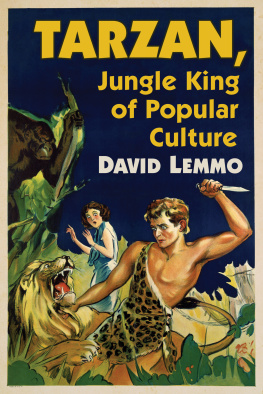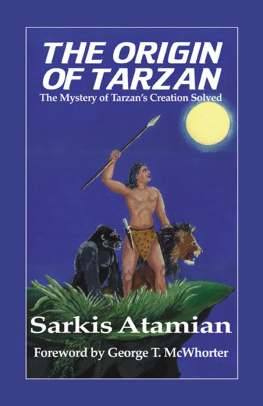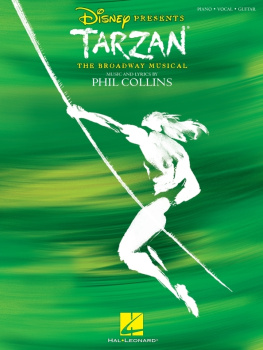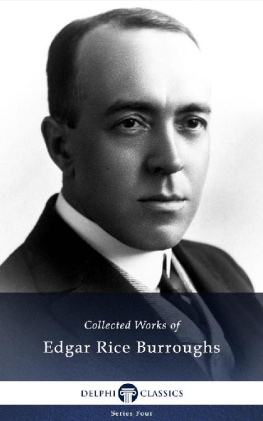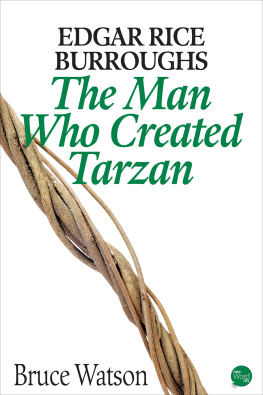David Lemmo - Tarzan, Jungle King of Popular Culture
Here you can read online David Lemmo - Tarzan, Jungle King of Popular Culture full text of the book (entire story) in english for free. Download pdf and epub, get meaning, cover and reviews about this ebook. genre: Non-fiction. Description of the work, (preface) as well as reviews are available. Best literature library LitArk.com created for fans of good reading and offers a wide selection of genres:
Romance novel
Science fiction
Adventure
Detective
Science
History
Home and family
Prose
Art
Politics
Computer
Non-fiction
Religion
Business
Children
Humor
Choose a favorite category and find really read worthwhile books. Enjoy immersion in the world of imagination, feel the emotions of the characters or learn something new for yourself, make an fascinating discovery.
- Book:Tarzan, Jungle King of Popular Culture
- Author:
- Genre:
- Rating:4 / 5
- Favourites:Add to favourites
- Your mark:
- 80
- 1
- 2
- 3
- 4
- 5
Tarzan, Jungle King of Popular Culture: summary, description and annotation
We offer to read an annotation, description, summary or preface (depends on what the author of the book "Tarzan, Jungle King of Popular Culture" wrote himself). If you haven't found the necessary information about the book — write in the comments, we will try to find it.
Tarzan, Jungle King of Popular Culture — read online for free the complete book (whole text) full work
Below is the text of the book, divided by pages. System saving the place of the last page read, allows you to conveniently read the book "Tarzan, Jungle King of Popular Culture" online for free, without having to search again every time where you left off. Put a bookmark, and you can go to the page where you finished reading at any time.
Font size:
Interval:
Bookmark:


McFarland & Company, Inc., Publishers
Jefferson, North Carolina
e-ISBN: 978-1-4766-2622-2
LIBRARY OF CONGRESS CATALOGUING DATA ARE AVAILABLE
BRITISH LIBRARY CATALOGUING DATA ARE AVAILABLE
2017 David Lemmo. All rights reserved
No part of this book may be reproduced or transmitted in any form or by any means, electronic or mechanical, including photocopying or recording, or by any information storage and retrieval system, without permission in writing from the publisher.
Front cover: Poster art for the 1932 film Tarzan the Ape Man (MGM/Photofest)
McFarland & Company, Inc., Publishers
Box 611, Jefferson, North Carolina 28640
www.mcfarlandpub.com
To Rachael Wenban
The author wishes to pay his respects to the many people who helped in the creation of this book:
George T. McWhorter, who proofread the original manuscript and added information while attending to his duties at the University of Louisville Ekstrom Librarys Edgar Rice Burroughs Memorial Collection. Rachael Wenban, who took the time from a busy schedule to proofread. Ralph Brown, who allowed me to scan and photograph items from his incredible Tarzan archives. Katie Brown, who read through the manuscript and offered constructive comments and encouragement. Bill Hillman, for his help and fantastic website ERBzinean amazing wealth of information. Bruce Bozarth, for his amazing website ERBLIST.com, and his help finding information. Delinda Buie of the University of Louisville Ekstrom Library for delivering manuscript chapters to George McWhorter. Henry Garfield, friend, author and a great writing teacher. Bob Roehm of the University of Louisville Ekstrom Library for his help and enthusiasm. Brian Shaggy Smith, for encouragement and reading through chapters. Mike Sirota, another friend, a great writing teacher and Tarzan fan. James M. Waxon, a friend and fan who added information used in the book. Robert Zeuschner, for his Burroughs bibliography and help finding information.
First appearing in 1912, Tarzan of the Apes is a multimedia superstar whose social impact and cultural heritage extends beyond mere entertainment. As the seminal 20th century superhero, his contribution to the explosion of popular culture is worldwidehe stands at the head of a line of early archetypes such as the Shadow and Doc Savage, who were later combined by writers to create new ones such as Superman and Batman. Today he takes on his greatest foe, his own media incarnations, competing against himself while influencing American culture and philosophy.
The Ape-Man also helped pioneer (starting in 1916) the pervasive fandom movement. Before World Cons, Comic-Cons and the Star Trek phenomena, Tarzan fandom was aiding in the acceptance of popular culture as a valid subject of academic study. Since then, the incredible growth and influence of pop culture has turned fandom from a loose-knit organizations of geeks into a mainstream phenomenon that generates billions in revenue and ensures the future legacies of archetypes like Tarzan.
The Lord of the Jungle has along the way adapted to the pop culture pantheon he helped create. Hes a century-old example of the tendency of media archetypes to change, combine and recombine in response to shifting audience tastes and sensibilities. Many fans are defining life and personal experiences based on fictional characters and universes, as people have long done with historical or religious figures.
I discovered Tarzan during the mid1950s while reading the daily and Sunday newspaper comics sections, and also in the pages of Dell Comics Tarzan. By the time I was 11, I was a great fan of the Tarzan movies, and then I made the discovery there were also great novels. Later in life I became a bookseller, specializing in, among other things, the works of Edgar Rice Burroughs. I worked for the Holmes Book Company in Oakland, California, and utilized their considerable research collection. I also learned a lot on the subject by working book fairs hosted by the Antiquarian Booksellers Association of America.
Of the many works I read in preparation for the telling the story of Tarzans transcendence in world of pop culture, Irwin Porges Edgar Rice Burroughs: The Man Who Created Tarzan is highly recommended. In researching Tarzans life, I delved into the movies and TV episodes, the comics, and magazines articles, combed the vast downtown Los Angeles library, and explored the Internet. And then theres ERBzine, the official Edgar Rice Burroughs tribute and weekly webzine site, with over 15,000 pages of archives. ERBzine has it all: documents, photographs, artwork and lots of information.
After I had written a first draft of this book, George T. McWhorter, creator and curator of the Edgar Rice Burroughs Memorial Collection in the University of Louisville, went through it, fixing things up here and there and adding information.
The origins of popular culture date back to the latter part of the 1700s, a period of urban growth, industrialization, mass media and technological development. During the 19th century, mass culture continued to develop with increasing urban populations, large-scale organizing of industry (including the division of labor) and the developing worldwide communications systems. By the early 20th century, mass communication had created a vast audience of media consumers that was ripe for the appearance of superheroes.
Fans of Sherlock Holmes may be said to have organized the first fandom conventions when they organized mourning events after the fictional detective was (supposedly) killed off in 1893, and some of the first Holmes fan fiction appeared as early as 1897. The first official Tarzan fan club, the Tribe of Tarzan Club, was organized in 1916 out of Staunton, Virginia, by a boy named Herman Newman. Science fiction and fantasy fandom dates back to the 1930s, and the World Science Fiction ConventionWorldconbegan in 1939, with Star Trek fandom, Comic-Con International San Diego, San Diego Comic Fest, Anime, SteamPunk and Manga all decades in the future.
Superheroes are now everywhere in American popular culture, in comics, movies, television, books, video games, merchandise, advertising and fan activities. Their origin can be traced through a study of the first multimedia superstar of the 20th century, Tarzan of the Apes, whose influence on American and world popular culture extends beyond the commercialism of books, movies, comics and mass-marketed merchandise, inspiring personal philosophies on life, politics and the activities of the fandom movement.
The comics, movies and memorabilia have made billions of dollars for the superhero industry. Popular culture changes constantly, forming branches and blending interdependent elements that influence us in many ways. After World War II, cultural and social forces, aided by mass media innovations, changed the meaning of popular culture by the blending of so-called lowbrow and highbrow tastes. Collecting memorabilia could now become an interesting and affordable hobby, a mere pastime or, in extreme cases, a complex nightmare of fan consciousness. Thousands of dollars are spent on memorabilia including rare comic books, movie posters, toys, recordings, books and costumes, supporting an industry that continues the legacies of their superheroes.
Next pageFont size:
Interval:
Bookmark:
Similar books «Tarzan, Jungle King of Popular Culture»
Look at similar books to Tarzan, Jungle King of Popular Culture. We have selected literature similar in name and meaning in the hope of providing readers with more options to find new, interesting, not yet read works.
Discussion, reviews of the book Tarzan, Jungle King of Popular Culture and just readers' own opinions. Leave your comments, write what you think about the work, its meaning or the main characters. Specify what exactly you liked and what you didn't like, and why you think so.

